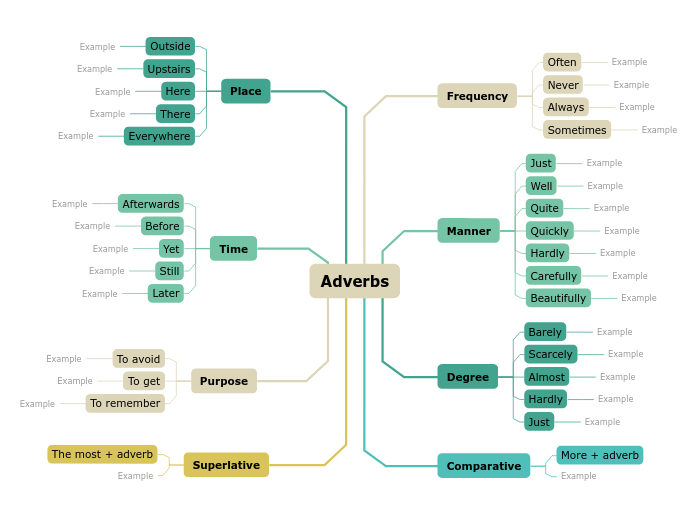English Adverbs Examples
Use this mind map to improve your understanding of how adverbs are used and practice by creating different contexts.
Keywords: grammar, language


更多类似内容
Adverbs are the parts of speech that describe verbs, adjectives, or other adverbs, phrases, clauses, or sentences.
There are different types of adverbs:
Adverbs of frequency
Adverbs of manner
Adverbs of degree
Comparative adverbs
Superlative adverbs
Purpose adverbs
Time adverbs
Place adverbs
Adverbs of frequency present how frequently or how often verbs happen. Some examples of adverbs of frequency are:
Often
Never
Always
Sometimes
Adverbs of manner provide information about the way the verb is done. Some examples of adverbs of manner are:
Just
Well
Quite
Quickly
Hardly
Carefully
Beautifully
Adverbs of degree provide information about the level of intensity of verbs, adjectives, or other adverbs. Some examples of adverbs of degree are:
Barely
Scarcely
Almost
Hardly
Just
Comparative adverbs are used to show change or make comparisons. Comparative adverbs are formed by adding the word ‘more’ to adverbs.
Adverbs of purpose express the reason of verbs. Some examples of adverbs of purpose are:
To avoid
To get
To remember
Adverbs of time offer information about the time when the verb takes place. Some examples of time adverbs are:
Afterwards
Before
Yet
Still
Later
Adverbs of place offer information about the place where the verb takes place. Some examples of adverbs of place are:
Outside
Upstairs
Here
There
Everywhere
Adverbs are words or expressions that modify a verb, adjective, another adverb, determiner, clause, preposition, or sentence. Adverbs typically express manner, place, time, frequency, degree, level of certainty, etc.
Compares three or more things or people, usually is compounded of the words 'the most' plus adverb.
Answers the question:
Answers the question:
Answers the question:
Compares two things or people, usually is compounded of the word 'more' plus adverb.
Answers the question:
Answers the question:
Answers the question:
Write phrases as examples.
思维导图可以帮助你集思广益,建立概念之间的关系,组织和产生想法。
然而,思维导图模板提供了一种更容易上手的方法,因为它们是包含特定主题信息和指导说明的框架。从本质上讲,思维导图模板确保了将特定主题的所有元素结合在一起的结构,并可作为个人思维导图的起点。思维导图模板是一种资源,可为创建特定主题的思维导图提供实用的解决方案,无论是用于商业还是教育。
Mindomo 为你带来智能思维导图模板,让你毫不费力地运作和思考。
描述性主题
带背景文字的主题
默认分支
删除模板数据
您可以从Mindomo的商业或教育账户中选择各种思维导图模板,也可以从头开始创建自己的思维导图模板。任何思维导图都可以转化为思维导图模板,只需在其中一个主题上添加进一步的指导说明即可。